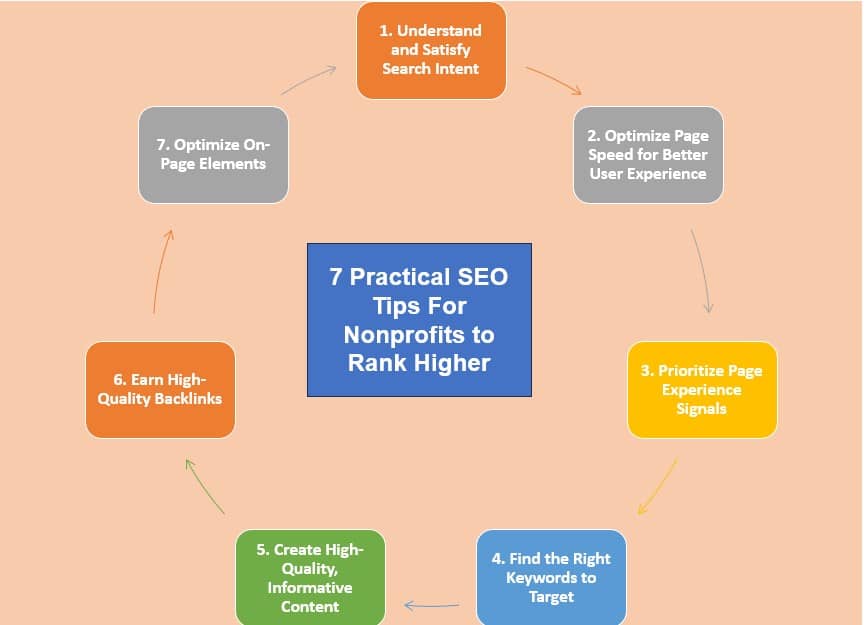Last Updated on August 27, 2024 by Admin
Would you like to increase the visibility of your non-profit organization among the virtual community? The process of Search Engine Optimization (SEO) could be a real game changer for any nonprofit organization. With it, you can reach an even wider audience, attract bigger donors, and grow to have a greater societal role.
As we explore this thorough guide, we’ll explore SEO for nonprofits and equip you with seven practical tips to improve your ranking in search results.
Why does SEO for Nonprofits Matter?
SEO for nonprofits is not of less importance because it assists you to get the people who are already looking for services, support, or causes just like yours. By doing SEO for Nonprofits for search engines, you can:
- Boost the visibility and draw more organic traffic
- Earn trust and credibility with trustworthy donors and volunteers.
- Bring the public to notice your project and the problems you are dealing with.
- Come up with effective online donation and fundraising strategies.
- Invest money less on paid marketing in the long run.
How Does SEO for Nonprofits Work?
Optimization of nonprofit SEO is nothing more than a set of tactics and procedures that increase the number of your website’s placement in search result pages. The key components of SEO include:
- Keyword research: Pinpoint the commitments people seek when seeking people like you.
- On-page optimization: Optimizing the website’s content and structure for the keywords it aims at will boost its rankings.
- Off-page optimization: Construct links of good quality that point to your website from popular and highly valued pages on the Internet.
- Technical SEO: The key to your success is creating a fast, mobile-friendly website that can be found by search robots and indexed by search engines.
Through these practices, you can enhance your nonprofit’s organic search results, drive traffic, and achieve the organization’s goals.
7 Practical SEO Tips For Nonprofits to Rank Higher
Now that you know that SEO for non-profit organizations is important and how it works, it is time to explore practical tips and strategies for ranking higher in the search engines. Such actionable insights will penetrate your digital marketing system, showing you how to improve your website, create captivating content, and strengthen your online presence.

1. Understand and Satisfy Search Intent
One of the most imperative fundamentals of SEO is search intent and fulfillment. When a user enters a search into the search engine, that user aims to achieve something that meets a certain need or expectation. Your content has to meet this purpose and offer the most accurate and useful information. So, the ranked websites will be the ones that follow this search intent.
To better understand search intent, ask yourself:
- What do the users want when they make inquiries using this keyword?
- What type of information will be most beneficial for answering their queries and solving their problems?
- What is the best possible manner in which I can create a superb and helpful guide on this matter?
Example: When somebody searches using the phrase “the most suitable method of volunteering at a local animal shelter,” they are probably trying to locate a step-by-step guide or a list of shelters in the area that accept volunteers. When developing content responsive to the searcher’s goal—in this case, a blog post that answers the question “How do I Volunteer at Animal Shelters?”—your chance of rising to the top of the SERP also increases.
2. Optimize Page Speed for Better User Experience
Website speed is one of the most important factors that is influencing SEO, as it is a direct factor affecting user experience. Viewers tend to have bad experiences on pages that load very slowly, and most leave the site much faster. This can make search engines rank your site lower. To optimize your nonprofit’s page speed:
- Make images smaller and use proper file formats (JPG for photos, PNG for graphics).
- Minimize and cut down on the HTML CSS and JavaScript code.
- Benefit from browser caching is the ability to store commonly used files on a local network.
- Use a CDN to cache your static content on servers in the same location as most users.
- Check your site loading speed frequently via PageSpeed Insights, a Google tool.
By applying this procedure, you will see a fast loading time of the page, which is the most important factor for visitor satisfaction and ranking in the search engine.
3. Prioritize Page Experience Signals
Google’s Page Experience update highlights which user experience signals go into the rankings. To ensure your nonprofit’s website meets these standards, focus on:
- Mobile-friendliness: Create a responsive website that adjusts to different screen sizes and is navigable on all devices, including mobile.
- Safe browsing: Protecting your site from malware, phishing scams, and other security issues remains of the utmost importance because it allows users to browse freely and securely.
- HTTPS: Install a secure connection using an SSL certificate intended to encrypt information and create trust with the users.
- Intrusive interstitials: Use pop-ups, overlays, or other elements to prevent interruptions that obscure the content or damage the user experience.
4. Find the Right Keywords to Target
Keyword research is mainly the basis of making your search engine optimization successful. By researching the words and phrases the people you are targeting type to find nonprofits like yours, you can top the charts for those searches. To find the right keywords:
- Elaborate on the words about your organization’s mission, services, and users.
- Put yourself in the shoes of your potential customer. Use keyword research tools like Google Keyword Planner, Ahrefs, or SEMrush to find high-volume, low-competition keywords.
- Analyze your competitors’ keywords to pinpoint areas where you can take a leading position.
- Work on long-tail keywords, which are more specific and easier to rank.
Example: An eco-focused nonprofit may target terms such as “steps on how to cut off carbon emission,” “how to collaborate with local environmental conservancy groups,” or “tips of sustainable living.”
5. Create High-Quality, Informative Content
We have often said that well-optimized SEO content is the king of SEO. Creating valuable, educational content will not only place your nonprofit higher in the rankings but also lead to the association of the nonprofit with expertise in the area of practice. When creating content for SEO for nonprofits:
- Concentrate on themes related to your mission and the ones that hit the nerves of your audience, which is made special.
- Ensure you provide comprehensive, well-cited content that clearly shows your authority on the topic.
- Write simply and straightforwardly so that the readers can easily read and grasp the meaning of it.
- Ensure that your written content is Search Engine Optimized and that you have the keywords you want to rank for, but make reading and adding real value for the visitor your priority.
- Leverage pictures, videos, and infographics to improve engagement.
6. Earn High-Quality Backlinks
A link from a website with a good reputation not only means that your content is valuable and credible but also indicates to search engines that your site deserves to get first place in the search results. The number of high-quality backlinks directed to your site increases the likelihood of your website ranking high in search engines. As a result, having more people visit your site helps drive more sales for your company. To earn these valuable backlinks:
- Develop receiver-friendly and self-propagating content that others would want to share and refer to, such as case studies, original research, captivating stories, or instructional guides.
- Claim another link from related nonprofits, bloggers, or journalists in your niche by reaching out with requests for links or exploring collaboration opportunities.
- Participate in online communities and forums related to your course, using your platform and putting links on your sites when necessary.
- Send guest posts to websites already written in the same niche, and make sure to include your site links in the author bio section or within the article content.
- Remember that it is not the quantity of backlinks you get but the quality that drives the most traffic to your site. To score higher in search engine rankings, prioritize receiving natural links from recognized, high-authority sites in your respective niche.
7. Optimize On-Page Elements
On-page optimization guarantees that the architecture of your website is so simple that search engines can quickly realize where it is and how to index it. Comprehensively retouching the major on-page factors will add to the site’s visibility and, thus, potential ranking. Focus on:
- Title tags and meta descriptions: Develop attractive, keyword-oriented headings and descriptions that accurately reflect your website’s content and motivate visitors to click on your page.
- Header tags (H1, H2, etc.): Apply header tags that will form a structure of your content, containing blocks of different sizes and arranged to simplify navigation for users and search engines.
- Image alt text: Provide your images with descriptive alt text, which helps searchers understand the picture’s content and allows people with visual impairments to explore it.
- Internal linking: Connect to other pertinent pages on your site using keyword-rich anchor texts to reveal its structure and pass link juice in a controlled manner to the other pages.
- URL structure: Apply for those that are easy to remember, use keywords, and represent your page’s content and hierarchy.
Conclusion
SEO is a practical option for nonprofits to increase web visibility, attract benefactors, and effect a larger change. Using the seven SEO for nonprofits tips mentioned, you can raise your website’s ranks, engage in the quality of organic traffic, and finally achieve the mission you have set. However, an organization may find this process complicated and time-consuming, especially for nonprofits with limited resources.
This is where our AlgoSaga digital marketing team steps in; they are professionals in SEO and have expertise in helping nonprofits succeed online. Connect with our SEO services now to learn how we can assist you in maximizing SEO’s contribution and taking your nonprofit to a higher level.
